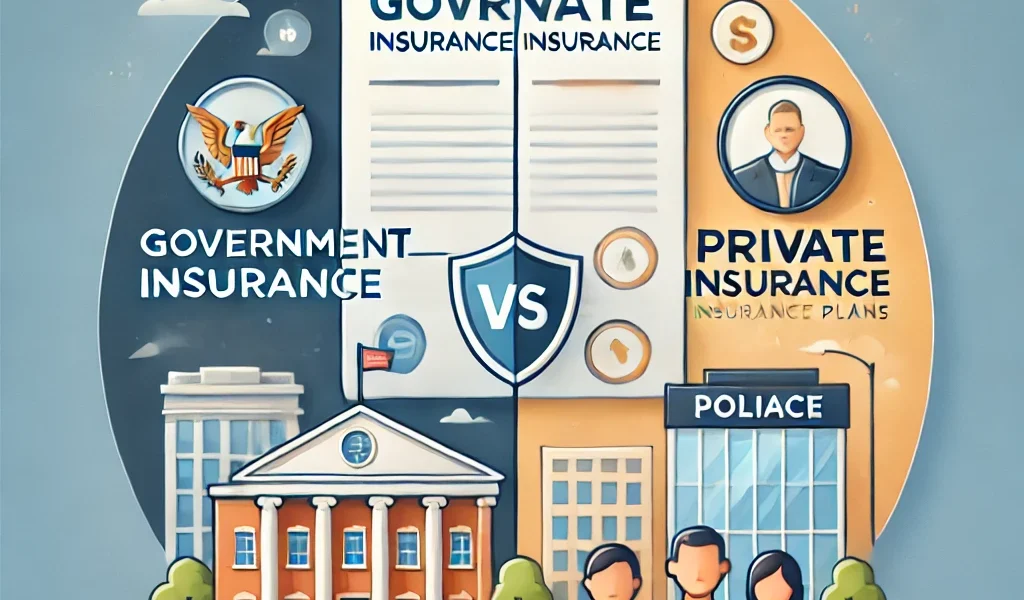Introduction
When it comes to choosing an insurance plan, individuals often face a crucial decision: should they opt for a government-sponsored insurance plan or a private insurance policy? Both types of insurance offer financial protection, but they differ in terms of coverage, cost, eligibility, and flexibility. In this comprehensive guide, we will compare government and private insurance plans to help you determine which one best suits your needs.
Understanding Government Insurance Plans
Government insurance plans are publicly funded programs designed to provide healthcare and financial security to specific groups of people. These plans are typically more affordable and accessible to lower-income individuals, seniors, and people with disabilities.
Common Types of Government Insurance Plans
- Medicare – A federal health insurance program primarily for individuals aged 65 and older, as well as some younger people with disabilities.
- Medicaid – A joint federal and state program that provides health coverage to low-income individuals and families.
- The Affordable Care Act (ACA) Plans – Also known as Obamacare, these marketplace plans offer subsidized health insurance for those who qualify based on income.
- Veterans Affairs (VA) Health Care – Healthcare coverage for eligible military veterans.
- Social Security Disability Insurance (SSDI) – Provides financial assistance to disabled individuals who cannot work.
Advantages of Government Insurance Plans
- Lower Costs: Premiums, deductibles, and out-of-pocket expenses are generally lower than private insurance.
- Guaranteed Coverage: Individuals with pre-existing conditions cannot be denied coverage.
- Wide Network of Providers: Many doctors and hospitals accept government insurance plans.
- Financial Assistance: Subsidies and funding help low-income individuals afford coverage.
Disadvantages of Government Insurance Plans
- Limited Coverage Options: Some treatments, medications, and specialists may not be covered.
- Longer Wait Times: Due to high demand, scheduling appointments and treatments can take longer.
- Income and Eligibility Restrictions: Not everyone qualifies for government insurance programs.
- Less Customization: Fewer options to tailor a plan based on individual needs.
Understanding Private Insurance Plans
Private insurance plans are offered by independent insurance companies and can be purchased individually or through an employer. These plans provide a variety of options, including health, auto, home, and life insurance policies.
Common Types of Private Insurance Plans
- Employer-Sponsored Insurance – Health insurance provided by an employer, often with cost-sharing between employer and employee.
- Individual Health Insurance – Plans purchased directly from an insurance company or through the health insurance marketplace.
- Supplemental Insurance – Additional policies such as dental, vision, or long-term care insurance.
- Term & Whole Life Insurance – Life insurance policies that offer financial protection to beneficiaries.
Advantages of Private Insurance Plans
- More Coverage Options: Plans can be customized based on personal needs.
- Shorter Wait Times: Faster access to specialists and treatments.
- Higher Quality Care: Access to a broader range of hospitals and healthcare providers.
- Flexible Eligibility: Available to anyone who can afford the premiums, with fewer restrictions.
Disadvantages of Private Insurance Plans
- Higher Costs: Premiums, deductibles, and out-of-pocket expenses are generally more expensive.
- Pre-Existing Condition Limitations: Some policies may have restrictions or exclusions based on medical history.
- Complex Policies: Private plans can be difficult to navigate due to varying terms and conditions.
Key Factors to Consider When Choosing Between Government and Private Insurance
1. Cost
- Government insurance is often more affordable due to subsidies and lower out-of-pocket expenses.
- Private insurance offers greater flexibility but comes at a higher cost.
2. Coverage
- Government plans typically cover essential health services but may lack comprehensive benefits.
- Private insurance provides more extensive coverage, including elective procedures and specialized treatments.
3. Eligibility
- Government plans have specific eligibility criteria based on income, age, or disability.
- Private insurance is available to anyone who can pay the premiums.
4. Provider Network
- Government plans may have a limited selection of healthcare providers.
- Private insurance often grants access to a wider network of doctors and specialists.
5. Flexibility
- Private insurance offers more plan choices and the ability to customize coverage.
- Government insurance plans have standardized benefits with limited customization.
Which One is Better for You?
The answer depends on individual needs, financial situation, and health requirements. Here’s a breakdown:
- Government Insurance is better for:
- Individuals with low income who qualify for Medicaid or ACA subsidies.
- Seniors or people with disabilities who are eligible for Medicare.
- Veterans who qualify for VA healthcare benefits.
- Private Insurance is better for:
- Individuals who want more control over their coverage and provider options.
- Those who can afford higher premiums in exchange for better care and flexibility.
- Employees who receive employer-sponsored insurance as part of their benefits.
Conclusion
Both government and private insurance plans have their own advantages and drawbacks. Government plans provide affordability and security, while private insurance offers more flexibility and faster access to healthcare. Evaluating your financial status, health needs, and long-term goals can help you determine which insurance plan is the best fit for you.
Before making a final decision, consulting a financial advisor or insurance expert can help you navigate the complexities of different plans and make an informed choice.




